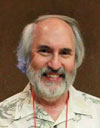|
Lectures |
| Week
1 |
Week
2 |
Week
3 |
Week
4 |
Week
5 |
Week
6 |
Week
7 |
Week
8 |
Week
9 |
Week
10 |
|
|
|
|
|
|
|
|
|
|
|
Tuesday, January
10th
|

|
Course Overview
& Introduction to Assistive Technology
David L. Jaffe, MS
Stanford University - Mechanical Engineering Design
Group |
Abstract: This presentation will
provide an overview of the course and a brief introduction to Assistive
Technology including a definition of terms, demographics, goals of
rehabilitation, perceptions of disability, the needs of people experiencing
disabilities, political correctness, and numerous examples of commercial
assistive technology products, research efforts, and students'
projects.
Biosketch: David L. Jaffe holds
a BS degree in Electrical Engineering from the University of Michigan and a MS
degree in Biomedical Engineering from Northwestern University.
Prior to coming to Stanford, he was a
Research Biomedical Engineer at the VA Palo Alto Health Care System's
Rehabilitation Research and Development Center. At the VA his interests were
designing, developing, testing, and bringing to market microcomputer-based
devices for veterans with disabilities including communication, mobility, and
information systems. He has worked on several VA assistive technology research
projects including an powered wheelchair interface for individuals with
quadriplegia, an electro-mechanical fingerspelling hand that served as a
communication device for people who are deaf/blind, a system that explored
virtual reality techniques to train individuals with gait deficits to improve
their walking, and a project that employed a computer-based simulation system
to assess and improve the driving ability of individuals after brain
injury.
In addition to organizing this course,
ENGR110/210 Perspectives in Assistive Technology, he contributes to
other Stanford courses including defining the quarterly course projects in
ME218 Smart Product Design, coaching project teams in ME113
Mechanical Engineering Design and ME294 Medical Device Design, as
well as mentoring students working on assistive technology projects throughout
the year.
- Contact
Information:
- 650/892-4464
- dljaffe -at-
stanford.edu
- Lecture Material:
- Slides - 8.12 Mb pdf file
- Video - 1:14:38
- Photos - 428 Kb pdf file
- Videos:
- Ultrasonic Head Controlled
Wheelchair
- Ralph Fingerspelling Hand
(takes a while to load)
- Links:
- Ed Roberts Campus - a universally
designed, transit–oriented campus
- Physical
and Mobility Impairment Factsheet
|